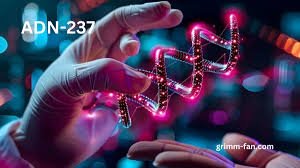ADN-237: A Promising Solution for Enhancing Brain Health

Recently, there has been a growing focus on exploring ways to boost brain health and combat neurological decline, culminating in exciting findings like ADN-237. This cutting-edge drug candidate is under careful examination due to its promising potential in treating neurodegenerative diseases and cognitive decline. With encouraging outcomes emerging from preliminary studies, ADN-237 may soon have a significant impact on safeguarding the brain against aging-related decline and neurological harm. This article will explore the scientific foundation of ADN-237, examining its therapeutic potential, safety, and diverse applications to provide a comprehensive overview of this promising medication.
What is ADN-237?

ADN-237 has been developed as an innovative neuroprotective solution designed to enhance brain well-being by addressing neurodegenerative conditions. The drug’s distinctive approach focuses on safeguarding brain functionality and reducing cognitive deterioration, positioning it as a crucial contender in research on conditions like Alzheimer’s and Parkinson’s. Given the rising prevalence of brain-related conditions, there is a great deal of anticipation surrounding innovative treatments like ADN-237.
Exploring the Mechanism of ADN-237: Unveiling the Scientific Foundation of the Compound
The focus of ADN-237 lies in the specialized neural pathways linked to cognitive health and adaptability. Its molecular structure allows it to efficiently interact with brain receptors, potentially supporting neuron survival and addressing the root causes of cognitive decline. Preliminary research suggests that ADN-237 may assist in combating oxidative stress within brain cells, a key contributor to cognitive aging. Moreover, ADN-237 helps facilitate the release of crucial neurotrophic factors like Brain-Derived Neurotrophic Factor (BDNF), essential for the growth and maintenance of neurons.
Potential Advantages of ADN-237 in Addressing Neurodegenerative Conditions
Initial research indicates that ADN-237 holds promise in potentially managing or even halting the progression of various neurodegenerative conditions. The neuroprotective properties of ADN-237 could offer significant relief to those affected by these conditions, presenting valuable treatment possibilities. Potential applications include:
- Alzheimer’s Disease: Studies show ADN-237 may help slow disease progression, supporting memory and cognitive function.
- Parkinson’s Disease: ADN-237 may help reduce oxidative damage, potentially improving cognitive and motor symptoms associated with the disease.
- Huntington’s Disease: ADN-237’s neuroprotective benefits may be advantageous for individuals with Huntington’s, a condition marked by rapid cognitive decline.
Potential Contributions of ADN-237 to Enhancing Cognitive Well-being
With cognitive enhancement gaining popularity among people of all ages, ADN-237 emerges as a promising option. Age-related cognitive decline is influenced by multiple factors, and ADN-237’s potential to address these issues is evidenced by its ability to:
- Improve Neurotransmitter Function: Enhancing memory, learning, and mental clarity.
- Reduce Neuroinflammation: Its anti-inflammatory properties may help manage neuroinflammation, a major factor in cognitive decline.
- Enhance Synaptic Plasticity: By fostering flexibility in brain cells, ADN-237 aids memory formation and cognitive resilience.
Mechanisms Behind the Neuroprotective Capabilities of ADN-237
Studies on ADN-237 have uncovered several key mechanisms that contribute to its potential in preserving and promoting brain health:
- Antioxidant Properties: ADN-237 combats harmful free radicals, reducing cellular stress linked to cognitive aging.
- Enhancing Mitochondrial Function: By supporting mitochondrial health, ADN-237 helps maintain neuron performance, which is essential for cognitive function.
- Supporting Growth Factor Production: ADN-237 may boost the production of growth factors like BDNF, which are vital for neuron health.
Ongoing Advancements in ADN-237 Research and Development
Currently, ADN-237 is undergoing initial clinical trials to assess its safety and efficacy in humans. These trials are targeting individuals in the early stages of neurodegenerative diseases, with further studies focusing on general cognitive enhancement. Animal studies have shown promising results in enhancing memory and cognitive functions, and upcoming human trials will aim to validate these findings.
Safety Profile and Potential Side Effects of ADN-237
Ensuring safety is crucial when developing new medications, and ADN-237 is no exception. Early studies indicate a promising safety record, with only mild side effects reported in some cases, including:
- Headaches: Mild headaches may occur due to increased neural activity.
- Gastrointestinal Discomfort: Some individuals have experienced mild stomach upset.
- Fatigue or Drowsiness: A few individuals may feel fatigued initially as their brain adjusts to ADN-237.
Further research is essential to verify long-term safety, a critical step for regulatory approval.
Potential Applications of ADN-237 in the Pharmaceutical Industry
Interest in neuroprotective medications is growing due to an increasing need for treatments that can help prevent cognitive decline and enhance mental well-being. If ADN-237 proves effective in human trials, it could become a prominent option in neuropharmacology, potentially benefiting from personalized dosing approaches based on individual genetics and lifestyle.
Final Thoughts
ADN-237 presents a promising advancement in neuropharmacology, with potential applications in treating neurodegenerative conditions and promoting overall cognitive health. As research progresses, ADN-237 could become an essential tool in combating neurological disorders, holding the promise of improved quality of life and mental well-being. While there is much more to learn, initial findings are encouraging, and both healthcare professionals and those affected by brain disorders are watching its development with anticipation.
Frequently Asked Questions Regarding ADN-237
What is the primary use of ADN-237?
Research on ADN-237 focuses on its potential as a neuroprotective treatment for addressing neurodegenerative conditions and supporting cognitive health.
How does ADN-237 function within the brain?
ADN-237 works by targeting neural pathways, reducing oxidative stress, promoting the production of growth factors, and enhancing neurotransmitter function to help preserve cognitive health.
What are the potential advantages of ADN-237?
ADN-237 may help slow the progression of conditions like Alzheimer’s and Parkinson’s while also supporting overall cognitive enhancement.
Is ADN-237 considered safe for use?
Initial studies indicate a favorable safety profile, with only mild side effects reported. However, more research is necessary to confirm long-term safety.
Could ADN-237 enhance memory?
Studies suggest ADN-237 may aid in memory retention by boosting neurotransmitter activity and supporting synaptic plasticity.Read more at Jameliz.co.uk